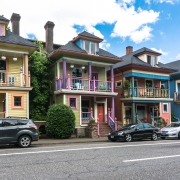Portland Is Trying to Tax Airbnb to Fund Local Home Ownership
Just a few months ago, the mayor of Portland, Oregon, Ted Wheeler, proposed a new tax on Airbnb and other home sharing companies. Hoping to bring in an additional $1.2-$2.5 million towards the city’s housing budget, this new tax would charge $4 per night, per room on all home sharing businesses operating within city limits. Additionally, hosts who list their homes on these home sharing platforms will also be required to pay a 2 percent charge to the city, which is estimated to bring in an additional $720,000 to $840,000 a year, all of which will go towards the city’s tourism department.
As with most taxes of this nature, advocates are fueled by good intentions. In this case, Portland officials believe that Airbnb and the home sharing sector are somehow making it harder for Portland residents to find housing. Unfortunately, the logic behind this proposed tax is severely lacking.
City Commissioner Nick Fish stated:
“Short-term rentals take apartments off the market for people who live here—it’s only fair that companies like HomeAway and Airbnb offset their impact by helping us replace the affordable homes Portland is losing to this industry. We look forward to a conversation about the best use of those funds.”
For starters, there is no substantial evidence that Airbnb is making it harder for Portland residents to find housing. Correlation, after all, does not always spell causation. But to make matters worse, the city intends to direct these funds to a program that has already failed dismally. Initially created to help Portland residents displaced by city development, the government program has only managed to help six people in three years. This doesn’t create a whole lot of confidence.
And then, of course, there is also a huge problem with asking a private company to pay for a problem simply because they are successful and profitable.
Prior to Portland’s proposal, Seattle passed a new law that would levy employment taxes on big businesses and direct that revenue towards helping the homeless. By their logic, since Amazon offers highly competitive salaries, it has caused an influx of people to Seattle who now have the means to afford more expensive homes. This has driven up housing costs and, according to the city, has meant that many Seattle residents are now left homeless.
Apparently, Portland caught wind of Seattle’s big business money grab and is not attempting its own version of the scheme. But condemning Airbnb for making housing harder to find is ridiculous, especially since the opposite is true. When an article announcing this tax was posted on a local news site, one commenter wrote:
“You know what helps people keep their homes when they suffer reduced income, a large medical expense, or some other major financial issue? Being able to rent part of their home out on Airbnb.”
And this commenter hit the nail on the head. In neighborhoods where housing costs are high, residents have found a way to earn extra income by renting out space on Airbnb and other home sharing sites. This has allowed people to be able to live in pricey, popular cities that they may not otherwise have been able to afford. Airbnb is actually helping to ease the burden of finding housing in Portland.
Additionally, levying a tourism tax on hosts who list their property on Airbnb is also absurd. Airbnb is helping to drive more tourists into the city. Hotels are expensive and often hard to find, that is why so many tourists have turned to Airbnb. In fact, that is precisely why Airbnb originally became a household name.
During the Democratic National Convention in 2008, the entire city of Denver, where the event was held, was out of hotel rooms. People were desperate for lodging accommodations and it also happened to be when Airbnb launched their site. As a result, many tourists were able to find housing. This is the beauty of Airbnb.
So by levying this tax on the hosts, Portland is essentially penalizing Airbnb for bringing in tourists, and then using that money to further fund the city’s tourism. It doesn’t make a whole lot of sense, but neither do any of these types of laws.
If cities like Portland and Seattle are not more careful, they will start to see big businesses flee their cities so as to avoid having to deal with these burdensome taxes.




